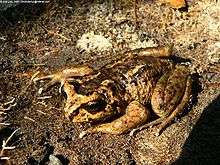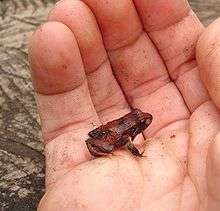Alsodidae
The Alsodidae are a small family of frogs from South America between Patagonia and southern Brazil. It contains 30 species in three genera.[1][2] This family, along with several other families, used to be included in the family Leptodactylidae.[3] It was then a subfamily in the family Cycloramphidae, before being recognized as a family first in 2011.[4]
| Alsodidae | |
|---|---|
 | |
| Alsodes verrucosus | |
| Scientific classification | |
| Kingdom: | Animalia |
| Phylum: | Chordata |
| Class: | Amphibia |
| Order: | Anura |
| Clade: | Hyloidea |
| Family: | Alsodidae Mivart, 1869 |
| Type genus | |
| Alsodes Bell, 1843 | |
| Genera | |
|
3, see text. | |
| Synonyms | |
|
Alsodinae Mivart, 1869 | |
Genera
The family contains three genera:[1][2]
- Alsodes Bell, 1843 (19 species)
- Eupsophus Fitzinger, 1843 (10 species)
- Limnomedusa Fitzinger, 1843 (1 species)
However, the placement of Limnomedusa is highly uncertain, and it might belong to the family Cycloramphidae.[1] In contrast, Alsodes+Eupsophus group (sensu stricto, after moving some species formerly included in the latter genus to other genera) forms a well-supported, monophyletic group. These genera are Patagonian endemics and represent the largest part of the amphibian diversity in that area. Eupsophus species are restricted to forested areas at southern latitudes, but some species of Alsodes reach the arid Andean slopes in central Chile and Argentina.[5]
References
- Frost, Darrel R. (2016). "Alsodidae Mivart, 1869". Amphibian Species of the World: an Online Reference. Version 6.0. American Museum of Natural History. Retrieved 25 April 2016.
- "Alsodidae". AmphibiaWeb: Information on amphibian biology and conservation. [web application]. Berkeley, California: AmphibiaWeb. 2016. Archived from the original on 9 October 2014. Retrieved 25 April 2016.
- Blackburn, D.C.; Wake, D.B. (2011). "Class Amphibia Gray, 1825. In: Zhang, Z.-Q. (Ed.) Animal biodiversity: An outline of higher-level classification and survey of taxonomic richness" (PDF). Zootaxa. 3148: 39–55.
- Pyron, A. R.; Wiens, J. J. (2011). "A large-scale phylogeny of Amphibia including over 2800 species, and a revised classification of extant frogs, salamanders, and caecilians". Molecular Phylogenetics and Evolution. 61 (2): 543–583. doi:10.1016/j.ympev.2011.06.012. PMID 21723399.
- Blotto, B. L.; Nuñez, J. J.; Basso, N. S. G.; Úbeda, C. A.; Wheeler, W. C.; Faivovich, J. N. (2013). "Phylogenetic relationships of a Patagonian frog radiation, the Alsodes + Eupsophus clade (Anura: Alsodidae), with comments on the supposed paraphyly of Eupsophus". Cladistics. 29 (2): 113–131. doi:10.1111/j.1096-0031.2012.00417.x.
